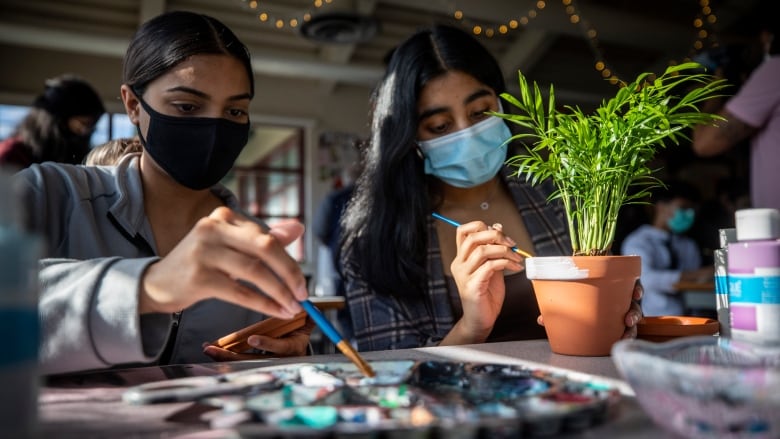How plants are helping students deal with pandemic anxiety in this Surrey classroom
Tamanawis Secondary School students grow plants in personalized pots and look after them throughout the term

When you walk into Mariam Hazhir's classroom, you are greeted by dozens of plants lining the window sills and tables and at least one plant on each desk.
They're part of an initiative Hazhir calls "the plant project," where her students Tamanawis Secondary School in Surrey, B.C., grow and care for their own plant in a personalized pot throughout the term as a way of helping them deal with their anxiety.
The idea came to her as a way to teach a basic life skill — growing plants — but soon transformed into something more meaningful.
Hazhir says she has seen an increase in mental health issues among her students since the pandemic began almost two years ago.
"We've seen an increase in anxiety, panic attacks," the teacher said.

Hazhir, who came to Canada as a refugee at the age of eight, says she was taught as a child to be open about sad experiences and to share them with family and friends.
To get her students to feel comfortable sharing their fears and anxieties, Hazhir thought of the Persian concept sang-e saboor — where confiding in a person or object can help take a person's sorrow away.
As part of the plant project, which she started in 2020, Hazhir asks her students to think of what's bothering them and to share those thoughts with their plants.
"I embed that into their head so that when they're watering the plants, they're thinking those thoughts," she said.
Students can put their plants on their desks if they are feeling anxious or having a hard day. Hazhir says students often put their plants on their desks when they are writing a test.

Jiya Gill, a Grade 11 student at Tamanawis Secondary, says she was skeptical about the project at first because she didn't really like plants.
But Jiya — who said the pandemic had been tough on her and her classmates, and that her grades had been dropping over the past two years — found the effects of looking after her plant beneficial.
"I actually found it very relaxing at the end of the day because we actually had a quiet time to focus," says Gill, referring to the time spent at the end of class watering the plants.
Susan Gerofsky, an associate professor in environmental education at the University of British Columbia, thinks the project is a wonderful idea.
She says it can be therapeutic "to have a companion that is related to them, that they have helped nurture and help grow."
"To feel that hope and joy of new life ... it really does influence people," she said, adding that plants have provided great companionship to humans during the past two years of increased isolation.

Hazhir says the project has improved her relationship with her students, and that it's helped her as much as it has helped her students — "because when they feel safe, when they're happy, it makes me happy."
She says she hopes to continue the project with every new class.
CBC British Columbia has launched a Surrey bureau to help tell your stories with reporter Kiran Singh. Story ideas and tips can be sent to kiran.singh@cbc.ca.